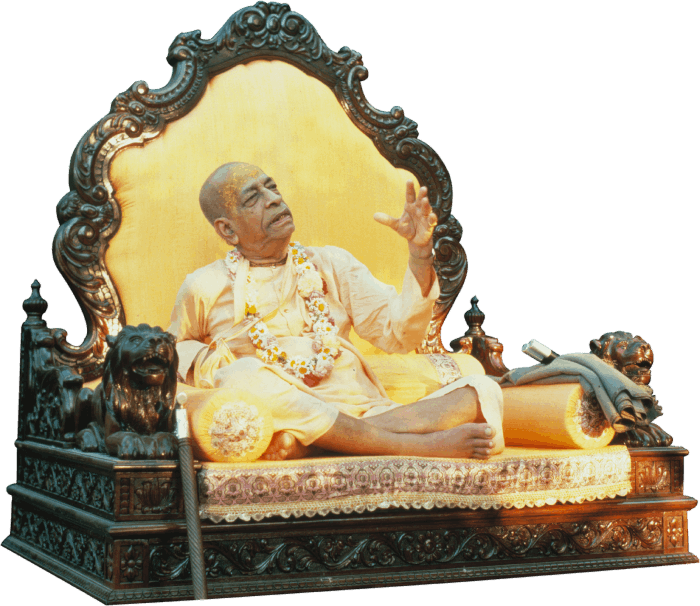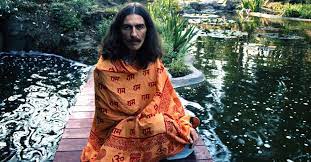
Your ever well-wisher

A.C. Bhaktivedanta Swami

KRISHNAPATH
The Official Source For Srila Prabhupada's Original Books

Your ever well-wisher

A.C. Bhaktivedanta Swami

The Official Source For Srila Prabhupada's Original Books

At Friar Park (1996). From left to right: Srila Prabhupada, George’s then wife Patti Boyd, George Harrison
In this interview by Mukunda Das, George Harrison talks about his experiences with mantra meditation, how he chanted with the other Beatles, and shares his thoughts on karma, vegetarianism, God and the goal of life.
“Let’s face it. If you’re going to have to stand up and be counted, I figured, “I would rather be with these guys than with those other guys over there.” It’s like that. I mean I’d rather be one of the devotees of God than one of the straight, so-called sane or normal people who just don’t understand that man is a spiritual being, that he has a soul.
So it was a spiritual thing that just fit in with my life-style. I could still be a musician, but I just changed my consciousness, that’s all.”


Mukunda: As a practitioner of japa-yoga, what realizations have you experienced from chanting?
George: Prabhupada, acarya (spiritual master) of the Hare Krishna movement, told me once that we should just keep chanting all the time, or as much as possible. Once you do that, you realize the benefit. The response that comes from chanting is in the form of bliss, or spiritual happiness, which is a much higher taste than any happiness found here in the material world. That’s why I say that the more you do it, the more you don’t want to stop, because it feels so nice and peaceful.

Mukunda: How do you feel after chanting for a long time?
George: In the life I lead, I find that I sometimes have opportunities when I can really get going at it, and the more I do it, I find the harder it is to stop, and I don’t want to lose the feeling it gives me.
For example, once I chanted the Hare Krishna mantra all the way from France to Portugal, nonstop. I drove for about twenty-three hours and chanted all the way. It gets you feeling a bit invincible. The funny thing was that I didn’t even know where I was going. I mean I had bought a map, and I knew basically which way I was aiming, but I couldn’t speak French, Spanish, or Portuguese. But none of that seemed to matter. You know, once you get chanting, then things start to happen transcendentally.
Mukunda: Did any of the other Beatles chant?
George: Before meeting Prabhupada and all of you, I had bought that album Prabhupada did in New York, and John and I listened to it. I remember we sang it for days, John and I, with ukulele banjos, sailing through the Greek Islands chanting Hare Krishna. Like six hours we sang, because we couldn’t stop once we got going. As soon as we stopped, it was like the lights went out. It went on to the point where our jaws were aching, singing the mantra over and over and over and over and over. We felt exalted; it was a very happy time for us.
 Mukunda: The maha-mantra was prescribed for modern times because of the fast-paced nature of things today. Even when people do get into a little quiet place, it’s very difficult to calm the mind for very long.
Mukunda: The maha-mantra was prescribed for modern times because of the fast-paced nature of things today. Even when people do get into a little quiet place, it’s very difficult to calm the mind for very long.
George: That’s right. Chanting Hare Krishna is a type of meditation that can be practiced even if the mind is in turbulence. You can even be doing it and other things at the same time. That’s what’s so nice. In my life there’s been many times the mantra brought things around. It keeps me in tune with reality, and the more you sit in one place and chant, the more incense you offer to Krishna in the same room, the more you purify the vibration, the more you can achieve what you’re trying to do, which is just trying to remember God, God, God, God, God, as often as possible. And if you’re talking to Him with the mantra, it certainly helps.
Mukunda: In 1969 you produced a single called “The Hare Krishna Mantra,” which eventually became a hit in many countries. That tune later became a cut on the Radha-Krishna Temple album, which you also produced on the Apple label and was distributed in America by Capitol Records. A lot of people in the recording business were surprised by this, your producing songs for and singing with the Hare Krishnas. Why did you do it?
George: Well, it’s just all a part of service, isn’t it? Spiritual service, in order to try to spread the mantra all over the world. Also, to try and give the devotees a wider base and a bigger foothold in England and everywhere else.

Mukunda: How did the success of this record of Hare Krishna devotees chanting compare with some of the rock musicians you were producing at the time like Jackie Lomax, Splinter, and Billy Preston?
George: It was a different thing. Nothing to do with that really. There was much more reason to do it. There was less commercial potential in it, but it was much more satisfying to do, knowing the possibilities that it was going to create, the connotations it would have just by doing a three-and-a-half-minute mantra. That was more fun really than trying to make a pop hit record. It was the feeling of trying to utilize your skills or job to make it into some spiritual service to Krishna.
Mukunda: What effect do you think that tune, “The Hare Krishna Mantra,” having reached millions and millions of people, has had on the cosmic consciousness of the world?
George: I’d like to think it had some effect. After all, the sound is God.
Mukunda: When Apple, the recording company, called a press conference to promote the record, the media seemed to be shocked to hear you speak about the soul and God being so important.
George: I felt it was important to try and be precise, to tell them and let them know. You know, to come out of the closet and really tell them. Because once you realize something, then you can’t pretend you don’t know it any more.
I figured this is the space age, with airplanes and everything. If everyone can go around the world on their holidays, there’s no reason why a mantra can’t go a few miles as well. So the idea was to try to spiritually infiltrate society, so to speak. After I got Apple Records committed to you and the record released, and after our big promotion, we saw it was going to become a hit. And one of the greatest things, one of the greatest thrills of my life, actually, was seeing you all on BBC’s Top of the Pops. I couldn’t believe it. It’s pretty hard to get on that program, because they only put you on if you come into the Top 20. It was just like a breath of fresh air. My strategy was to keep it to a three-and-a-half-minute version of the mantra so they’d play it on the radio, and it worked. I did the harmonium and guitar track for that record at Abbey Road studios before one of the Beatles’ sessions and then overdubbed a bass part. I remember Paul McCartney and his wife, Linda, arrived at the studio and enjoyed the mantra.

Mukunda: You’ve been a vegetarian for years, George. Have you had any difficulties maintaining it?
George: No. Actually, I wised up and made sure I had dal bean soup or something every day. Actually, lentils are one of the cheapest things, but they give you A-l protein. People are simply screwing up when they go out and buy beef steak, which is killing them with cancer and heart troubles. The stuff costs a fortune too. You could feed a thousand people with lentil soup for the cost of half a dozen filets. Does that make sense?
Mukunda: A lot of people, when they just get started in spiritual life, worship God as impersonal. What’s the difference between worshiping Krishna, or God, in His personal form and worshiping His impersonal nature as energy or light?
George: It’s like the difference between hanging out with a computer or hanging out with a person. Like I said earlier, “If there is a God, I want to see Him,” not only His energy or His light, but Him.

Mukunda: What do you think is the goal of human life?
George: Each individual has to burn out his own karma and escape from the chains of maya (illusion), reincarnation, and all that. The best thing anyone can give to humanity is God consciousness. Then you can really give them something. But first you have to concentrate on your own spiritual advancement; so in a sense we have to become selfish to become selfless.
Mukunda: What about trying to solve the problems of life without employing the spiritual process?
George: Life is like a piece of string with a lot of knots tied in it. The knots are the karma you’re born with from all your past lives, and the object of human life is to try and undo all those knots. That’s what chanting and meditation in God consciousness can do. Otherwise you simply tie another ten knots each time you try to undo one knot. That’s how karma works. I mean, we’re now the results of our past actions, and in the future we’ll be the results of the actions we’re performing now. A little understanding of “As you sow, so shall you reap” is important, because then you can’t blame the condition you’re in on anyone else. You know that it’s by your own actions you’re able to get more in a mess or out of one. It’s your own actions that relieve or bind you.
Mukunda: Anyone who is sincere about making spiritual advancement, whatever one’s religion may be, can usually see the value of chanting. I mean if that person was really trying to be God conscious and trying to chant sincerely.
George: That’s right. It’s a matter of being open. Anyone who’s open can do it. You just have to be open and not prejudiced. You just have to try it. There’s no loss, you know. But the “intellectuals” will always have problems, because they always need to “know.” They’re often the most spiritually bankrupt people, because they never let go; they don’t understand the meaning of “to transcend” the intellect. But an ordinary person’s more willing to say, “Okay. Let me try it and see if it works.” Chanting Hare Krishna can make a person a better Christian, too.
Mukunda: Bob Dylan did a lot of chanting at one time. He used to come to the Los Angeles temple and came to the Denver and Chicago temples as well. In fact he drove across the United States with two devotees once and wrote several songs about Krishna. They spent a lot of time chanting.
George: That’s right. He said he enjoyed the chanting and being with them. Also Stevie Wonder had you on one of his records, you know. And it was great the song he put the chanting in–”Pastimes Paradise.”

Mukunda: When you were in Vrindavana, India, where Lord Krishna appeared, and you saw thousands of people chanting Hare Krishna, did it strengthen your faith in the idea of chanting to see a whole city living Hare Krishna?
George: Yeah, it fortifies you. It definitely helps. It’s fantastic to be in a place where the whole town is doing it. And I also had the idea that they were all knocked out at the idea of seeing some white person chanting on beads. Vrindavana is one of the holiest cities in India. Everyone, everywhere, chants Hare Krishna. It was my most fantastic experience.
Mukunda: You wrote in your book: “Most of the world is fooling about, especially the people who think they control the world and the community. The presidents, the politicians, the military, etc., are all jerking about, acting as if they are Lord over their own domains. That’s basically Problem One on the planet.”
George: That’s right. Unless you’re doing some kind of God conscious thing and you know that He’s the one who’s really in charge, you’re just building up a lot of karma and not really helping yourself or anybody else. There’s a point in me where it’s beyond sad, seeing the state of the world today. It’s so screwed up. It’s terrible, and it will be getting worse and worse. More concrete everywhere, more pollution, more radioactivity. There’s no wilderness left, no pure air. They’re chopping the forests down. They’re polluting all the oceans. In one sense, I’m pessimistic about the future of the planet. These big guys don’t realize for everything they do, there’s a reaction. You have to pay. That’s karma.
Mukunda: Do you think there’s any hope?
George: Yes. One by one, everybody’s got to escape maya. Everybody has to burn out his karma and escape reincarnation and all that. Stop thinking that if Britain or America or Russia or the West or whatever becomes superior, then we’ll beat them, and then we’ll all have a rest and live happily ever after. That doesn’t work. The best thing you can give is God consciousness. Manifest your own divinity first. The truth is there. It’s right within us all. Understand what you are. If people would just wake up to what’s real, there would be no misery in the world. I guess chanting’s a pretty good place to start.

Mukunda: Thanks so much, George.
George: All right. Hare Krishna!

 SAVE QR CODE
SAVE QR CODE